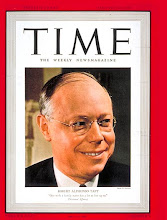It would seem that term limits are getting a hearing in 2010.
Among the tenets of the 1994 Republican Revolution was support for term limits, many of the GOP challengers promising to serve no more than three terms and retire. Most Republicans didn’t keep the promise, although ironically it was one promise Mark Sanford could keep.
The theme might be picking up steam again as Rand Paul won his primary election on a platform of term limits and no earmarks.
The antithesis: Ninety-Two years old, the longest serving member of the Senate and reportedly the “King of Pork,” Robert Byrd’s death is a reminder about the soundness of term limits and how even in as anti-Establishment an atmosphere as 2010, any meaningful change in Washington D.C. is little more than an exercise in futility unless something deeply penetrates the American soul.
Accompanying the obligatorily fawning obituaries of Robert Byrd, longest serving senator, reformed Klansman, constitutional scholar, has been the mention of his most enduring accomplishment: pork to West Virginia.
As chairman of the Senate Appropriations Committee, Byrd secured the lion’s share of federal money for his state. Dubbed the “King of Pork” as an insult, Byrd embraced the epithet as a badge of honor. It’s tempting to chuckle about how Byrd turned the charge on its head, but it also highlights the problem of enacting term limits.
The most obvious problem is that term limits are dependent on the willingness of the authorities to voluntarily relinquish power. If there is nothing as permanent as a temporary government program then what is more permanent than the bureaucrat who never retires?
But this problem cuts two ways.
A career politician becomes such not just because he won’t retire from office. Voters have to keep electing them. William Murchison of Chronicles magazine answers an important question:
“Nearly everyone has heard Lord Acton’s axiom about power: It ‘tends to corrupt.’ Corrupt whom, though? The power-wielders alone? Just as corrupted can be the beneficiaries of the exercise of power.”
If we’re supposed to believe that West Virginians weren’t grateful for the federal money Byrd sent their way for decades then how else might we explain how one the reddest states awarded the old Democrat nine terms in the Senate? Can West Virginians, or any American, name any piece of legislation Byrd ever authored?
On the issue of earmarks and appropriation, Americans can be a little fickle.
We are aghast when we realize how much money is wasted on a certain congressman or senator’s pet project back in their home state but we aren’t as appalled when our local farmers get subsidies or the community gets a new public park, even if the sign at the entrance has to be defaced with a politician’s name.
In short, we like the pork when we’re the ones getting it.
As such, Americans cannot possibly be serious about cutting spending or reducing the size of government unless we are willing to deny ourselves some of the luxuries we’ve become accustomed to receiving from the federal government. Part of this includes the luxury of having elected representatives dedicated to getting us the goodies.
Professor and columnist Walter Williams likes to tell a story about the late Senator Jesse Helms.
On principle, both Williams and Helms were opponents of subsidies, but Helms got them for his state anyway. Why?
Helms believed the voters of North Carolina would have sent him packing in favor of someone who would give them their God-given subsidies. Considering Helms was not a legislator known for buckling to the pressures of popular opinion, his story delivers a sad message about the mentality and entitlement of American voters.
Therefore, the solution is bound up in more than just an election or a few elections. It requires a change of heart. Demanding others give up their goodies requires giving up our own.
It also means Americans must stop asking themselves, “What can government do for me?” because when the government does something for me it has to do something for everyone else. In a nation of over 300 million, a $13 trillion deficit is just the start.
Was Benjamin Franklin right when he said that republics end when the people discover they can vote themselves money from the treasury?
Thursday, July 1, 2010
Limiting the Republic
Labels:
earmarks,
Jesse Helms,
pork,
Robert Byrd,
term limits,
Walter Williams
Subscribe to:
Post Comments (Atom)















2 comments:
I'm with you on term limits but I'm also just as resigned to them never happening.
I live in a bigtime red area yet Dick Durbin wins mine and the surrounding counties every election. He brings home the bacon.
Our god friend Ron Paul has also brought some bacon to his district so none of us are chaste in this regard. It's like an orgy in Washington. Everyone gets caught up in it with little regard for the consequences. Although a few of them at least pretend to feel guilty. Decorum must be maintained.
I think Ron Paul gets around the issue by getting earmarks in spending bills that he votes against. Like making the best of a bad situation. He did the same thing with his "Audit the Fed" bill. It got added as an amendment to a bill he ended up voting against.
And I'm with you on term limits never happening. John Shimkus is my representative and he first ran on a promise of no more than six terms which he has exceeded. He's said that unless everybody agrees to play by the same rules term limits don't make sense. He's not wrong about that.
Post a Comment